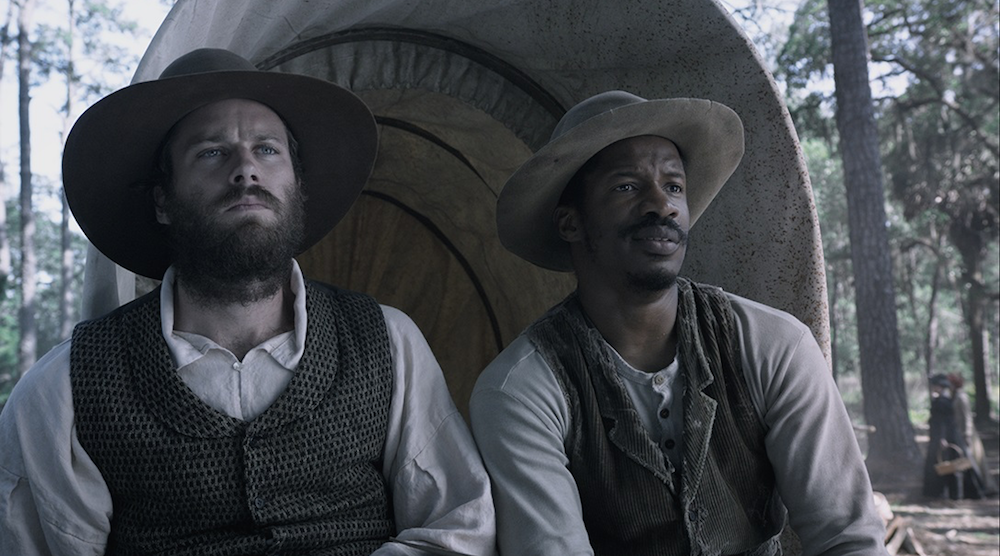With a title like The Birth of a Nation, it was inevitable that this film would be nothing short of incendiary. But perhaps Nate Parker didn’t expect his efforts would eventually turn on him, as they did when it was uncovered that Parker was involved and acquitted for the rape of a fellow student while he was in college. Although The Birth of a Nation was the talk of the town at its Sundance premiere (and broke records), it has been inevitably overshadowed by its creator’s controversy. Furthermore, the film itself, hard as it tries, fails to truly communicate its message with any subtlety.
First, Parker steps up the drama by giving it the same title as the famous Ku Klux Klan propaganda film from 1915. Then, after winning both the audience and grand jury prizes at Sundance Film Festival, The Birth of a Nation released two intense posters – one featuring the rebelling slaves lined up in red to look like a bleeding American flag and one featuring the lead Nat Turner with a noose around his neck - the noose is an American flag. The film made clear that this wasn’t going to mess around or gloss over anything.
The Birth of a Nation follows Nat Turner, a literate slave and preacher in the antebellum South, as he marries, starts a family, and witnesses the atrocities of slavery, eventually leading him to start an uprising. With films such as 12 Years a Slave (2013) and Django Unchained (2012) recently on our minds, The Birth of a Nation seems to follow in its footsteps and at times feels like a heavy-handed combination of the two.
Where 12 Years a Slave is emotionally brutal and Django Unchained is brutally violent, The Birth of a Nation is somewhere in between. In the first part of the film, we must quickly cover years as we see Nat Turner grow from a young boy to a young man to an adult with a wife and family. When his master Samuel Turner (Armie Hammer) falls on hard times, Samuel begins to take Nat around to other plantations so that Nat can preach obedience to other slaves. As Nat travels to other plantations, he quickly realizes that not everyone has it as easy as he does. He endures preaching submissiveness and obedience while slaves are beaten and tortured. The scenes of torture and violence are brutal – almost viciously so. Just as it is for Nat, it’s incredibly difficult to watch. Women are raped and beaten with a casual attitude that is sickening.
As Nat and the audience take all of this in and some of the violence begins to hit close to home, Nat quickly devises a plan for revolt that results in a group of slaves making their way through plantations, killing their owners along the way. Considering what these owners have done to them, it should feel pretty good to see these men killed by the oppressed. Like Django Unchained, much of it seems to ride on the thrill of vengeance.
Unfortunately, none of these grisly deaths feels redeeming or rewarding. On the contrary, by the time this revolt happens, it’s equally sickening to see violence breeding violence as slaves strike back against their masters.
At exactly 120 minutes, it’s clear that The Birth of a Nation was trying to fit quite a bit of material. In trying to do so much, we end up with a movie that says little. Emotional growth and development seems pushed away in order to give a broader picture of Nat’s upbringing and morality. Instead of taking their time to develop the emotion, they focus on plot. By the time the rebellion has come around, I don’t know enough about our characters to root them on while they go at an owner with an axe.
That said, The Birth of a Nation is a fine film and one clearly made with an immense amount of passion and care by Nate Parker. Sure, it’s difficult to split the film from its deeply entrenched star/director/writer, especially when you’re watching women get raped. Would I rush out and see it? Probably not. As fine as it is, I’ll be perfectly happy to go without seeing another slavery-centered film for a long, long while.

